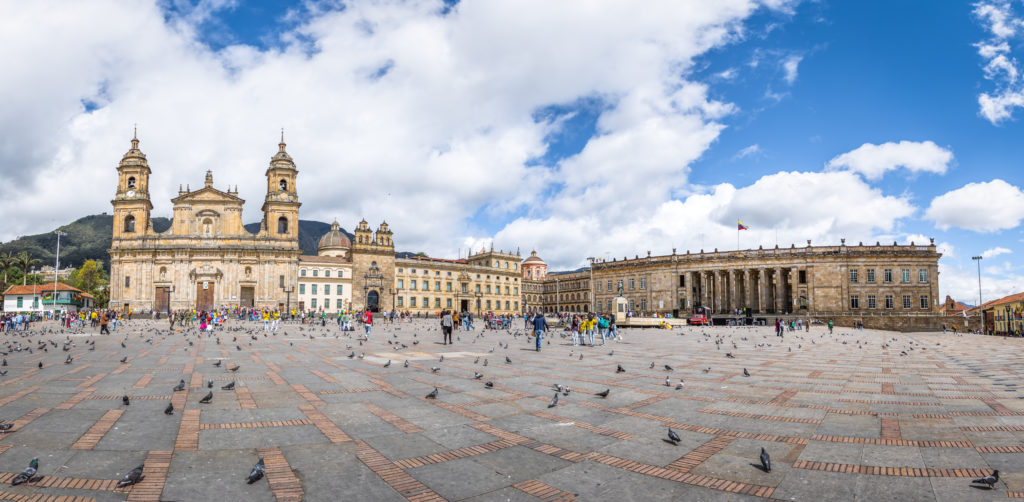
Panoramic view of Bolivar Square with Cathedral and Colombian National Capitol and Congress – Bogota, Colombia
Justice Rapid Response recently organized a tailored training – with the support of the Korea International Cooperation Agency (KOICA) – for justice experts in Colombia with the aim of bolstering accountability for international crimes by improving the documentation of sexual and gender-based violence (SGBV) and crimes affecting children amid the country’s transitional justice process.
The training, which ran online from 7 September to 15 October 2021, was given to more than 50 judges, prosecutors, analysts, and investigators from Colombia’s Special Jurisdiction for Peace (JEP), established to investigate and prosecute the worst crimes committed during the country’s 50-year armed conflict. The training, made possible by the financial support of KOICA, was specifically designed according to the needs of the JEP, with participants providing questions in advance.
This is the latest collaboration in a longstanding working relationship between Justice Rapid Response and the JEP, bringing international best practices to the national-led justice process. Thirteen Justice Rapid Response experts have been deployed – in many cases repeatedly – to the JEP since 2019, participating in the inception stages and creation of the national tribunal. Their areas of specialization have included witness protection, criminal analysis, psychosocial support, SGBV and child rights investigations, victim participation, restorative justice and case management.
“We have accompanied a number of different units throughout the JEP’s impressive achievements, from the development of guidelines for the investigation of crimes affecting children and SGBV cases, to providing support to macro-cases involving thousands of victims,” said Mary Diaz Marquez, Programme Officer with the Justice Rapid Response’s National Justice Programme. “It’s a privilege to be able to work with the JEP as Colombia has led the way in terms of the scope and innovation of its transitional justice process.”
The recent course built upon this partnership to further strengthen the capacities of judges, prosecutors, analysts, and investigators in the planning, investigation, and analysis of international crimes with a special focus on SGBV and violations that affect children.
“By focussing on sexual and gender-based violations, as well as crimes affecting children, right from the outset of the justice and accountability process, investigators and analysts can unearth and analyse information that can be used as evidence by prosecutors to build strong cases that specifically address these crimes,” said Katrin Weilhammer, Head of Justice Rapid Response’s National Justice Programme.
The aim of the training was to better equip participants for identifying which type of evidence they need to look for. This will lead to an improved documentation of SGBV both in the collective or ‘macro’ cases opened so far by the JEP and in the investigations that will be conducted by the JEP’s Investigation Unit.
The training was provided by four experts from Justice Rapid Response’s roster with extensive experience in investigating and prosecuting international crimes, including with international criminal tribunals and at the national level.
“We are very grateful to KOICA for its support as these exchanges between experts from Justice Rapid Response and the JEP offer a unique opportunity to share experiences from other countries or from international justice mechanisms and tailor lessons-learned and best-practices to the Colombian context,” said Ms. Weilhammer.
At the request of the JEP, the training also aimed to promote a comprehensive response of the justice system integrating a gender perspective and an intersectional approach addressing how the armed conflict has impacted LGBTIQ persons, children, indigenous communities, people with disabilities and Afro-Colombian communities differently.
Engaging national justice processes
On 15 October, as part of the training, Justice Rapid Response also for the first time coordinated a discussion between two different national justice processes to which it contributes expertise. The objective was for the partners – from Colombia and Guatemala – to discuss lessons learned from their respective experiences in the investigation of international crimes, including sexual and gender-based crimes.
During these peer-to-peer exchanges between practitioners, the JEP and the Ministerio Público discussed common challenges about the treatment of victims and witnesses of SGBV, including when dealing with indigenous communities and the collection of evidence. Participants agreed on the need to strengthen the application of international standards at the regional level in the investigation of international crimes and highlighted the importance of integrating a victim-centered approach throughout any investigation into gender-based crimes.
The JEP, which began working in March 2018, was born from the 2016 Peace Agreement with the FARC insurgency. The transitional justice mechanism is mandated to investigate and prosecute human rights violations, war crimes and crimes against humanity committed by all parties in the context of Colombia’s armed conflict up until 1 December 2016.